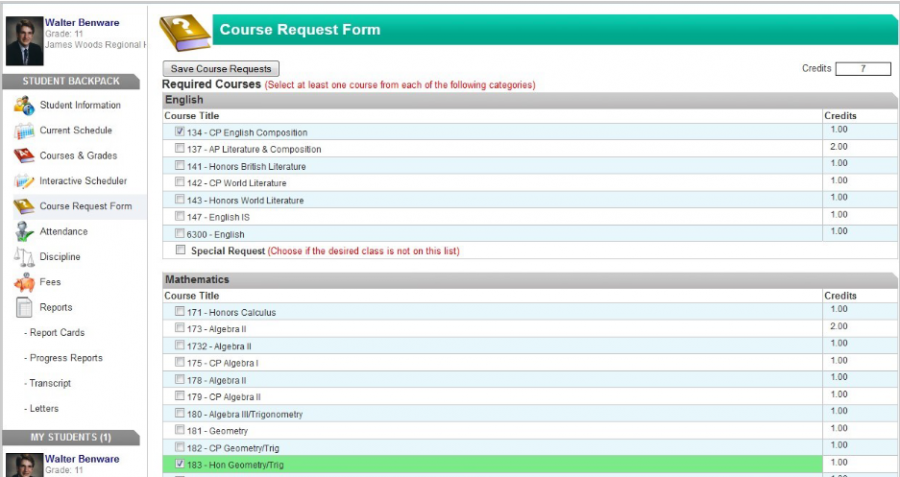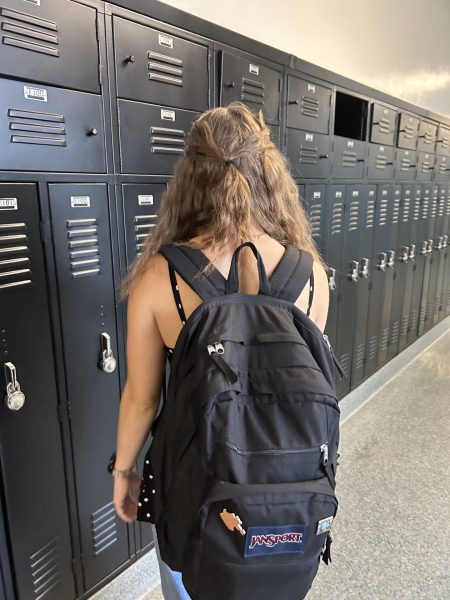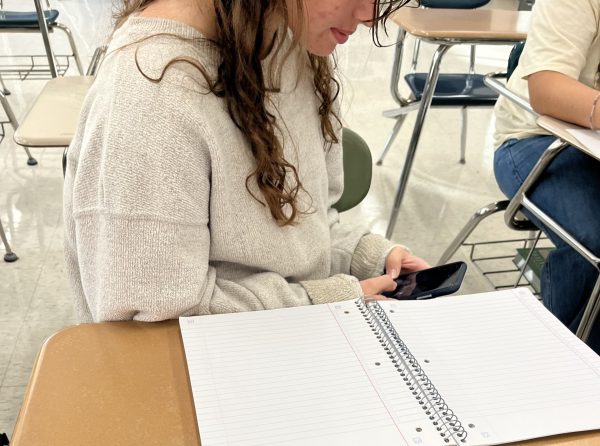Counselors guide students toward graduation
While picking courses for the next school year, you may choose the easiest classes or the ones that your friends take, but do you ever wonder what the guidance counselors think you should know about scheduling courses?
High School Guidance Counselor Mr. David Newell said students will attend meetings in mid to late Feb. in order to prepare for scheduling courses for the next school year. He said the course scheduler, where students will select the courses they want to take next school year, opened on Monday, Dec. 16, and will close on Sunday, Jan. 5. He added teachers have recommended students for Honors courses.
High School Guidance Counselor Ms. Leslie Robinson said the number of required credits in order to graduate has changed from the time she began working at Milton 19 years ago.
Ms. Robinson said when she began working at Milton 19 years ago, the school required 28 credits in order to graduate. She added the required number of credits changed to 22.5 due to a reduction in the number of teachers and courses offered. Therefore, some courses were no longer offered to students due to the decreased number of student requests for those courses, she said, including Astronomy, Economics and other foods courses. A career class was once required for freshman, but is no longer offered, due to the lack of a teacher to run the course, so it is not required anymore.
Mr. Newell said he recommends students ask themselves what their future goals are in order to schedule the most beneficial courses. “Always take classes you enjoy,” he added. “Take classes you need to help you.”
Ms. Robinson said she recommends students take the Law, Investment, Financial Education (L.I.F.E.) course to best prepare for life after high school.
From a survey taken by the senior class about what they thought was the most beneficial course, Advanced Placement (AP) Chemistry, L.I.F.E. and Spanish tied for first with five votes each out of the 55 responses received.
“If you know what you want to do…look at what you have to take in college and take those courses in high school,” said Mr. Newell. “Don’t take the easy way out.”
Ms. Robinson said if students plan to take weighted classes, the best AP or PC Now class depends on what the student plans to do after high school. She added almost all colleges recommend taking Psychology in high school, which can be taken as an AP, PC Now or Academic course depending on the number of student requests each course receives.
According to Mr. Newell, it is most beneficial to take courses for college credit because they save time and money. “It might not always save you money, but it will make your [college] course load lighter,” he added. “Because you have already taken them in high school, you won’t have to take them in college.”
Mr. Newell said the most interesting electives available would depend on the person. Ms. Robinson said the most requested classes are Guitar and the food courses. She added these courses are often very full.
High School Principal Mr. Andrew Rantz said the number of students allowed to take the class is different depending on the course.
“For example, only 20 students can take Guitar class because we only have 20 guitars,” he said. “However, we can accommodate up to 30 students in a Physics class.”
According to Mr. Newell, the most popular class usually changes every year. He added that if a course does not have enough students, the course will usually not run due to lack of interest. “[It] depends on the group of kids,” said Ms. Robinson. Mr. Rantz said a minimum of 12 students are required to run a course.
Mr. Newell said taking Career Technology Education (CTE) courses is beneficial to those that are planning on pursuing a career in those fields. CTE courses can be scheduled similarly to any other course; however, they cannot be taken until sophomore year, he added.
According to the Course Catalog on the district webpage, the CTE courses available are Automotive Technologies, Construction Trades, Drafting, Early Childhood and Criminal Justice. These courses are worth three credits each.
According to a survey taken by the senior class, the most popular CTE courses taken are Criminal Justice and Autoshop.
Ms. Robinson said if a course is no longer available in the school, it may be available online. The provider the school runs through for online courses is Capital Area Online Learning Association (CAOLA), said Mr. Rantz. “Sometimes they are available online, but not always,” Ms. Robinson added. CAOLA is always adding new online classes for students, she said.
According to Mr. Newell, he is not aware of the reason students are only required to have three credits for History, but four in English, Math and Science.
“There’s a minimum you need for the state, and then it’s probably up to the school board,” he added. Ms. Robinson added that when she graduated from Milton in 1983, students only needed three math credits to graduate.
According to Ms. Robinson, students are also required to pass Algebra, Biology, Health, U.S. History and all English classes in order to graduate. She added these courses best prepare students with the necessary skills for life.
According to the Pennsylvania Department of Education, 21 credits are required by the state: four English, three Math, three Science and three Social Studies.



